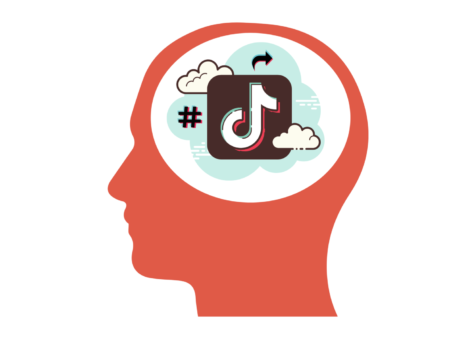OPINION | Students should practice self care with Tiktok
March 15, 2023

If you ever find yourself scrolling mindlessly through TikToks on a school night, chances are, you are not alone. But this unique Generation Z phenomenon may not be harmless for college students.
Since TikTok’s launch in September 2016, the app has altered how users understand social media. TikTok is a platform where users post short videos. The app uses a specialized algorithm to determine which videos will be interesting to each user and curates each user’s feed accordingly.
TikTok’s format can lead to compulsive behavior. Scrolling endlessly through short videos that are catered directly to a user’s interests can have detrimental effects. Sociologists and psychologists coined the term “TikTok Use Disorder” to describe how the app affects people’s brains.
TikTok Use Disorder is a non-chemical addiction disorder characterized by compulsive consumption of the media’s content and an inability to stop one’s consumption of this media. Symptoms associated with this newly studied disorder include shortened attention span, increased anxiety and depressive symptoms. In a study for the International Journal of Environmental Research and Public Health that examined a sample of more than 3,000 Chinese high schoolers, researchers found that TikTok usage was tied to depression, anxiety, stress and memory loss.
Another potential harm of overuse of TikTok is the reinforcing of unhealthy relationships with food and eating disorders. For example, if a user starts to view fitness videos, the algorithm will suggest videos of people’s bodies. These trends can drive users to compare themselves to others, creating unhealthy relationships with food or unrealistic fitness goals.
TikTok also has a subgenre of “nutrition content,” — hashtags like #WhatIEatinADay and #WeightLoss have gone viral and garnered billions of views. Many of these videos portray physically fit content creators who frequently tout unhealthy daily diets. Researchers from the University of Vermont found that “young females who create and engage with weight or food-related content on TikTok are at risk of having internalized body image and disordered eating behaviors from other aspects of their lives.”
Spending too much time scrolling through social media platforms like TikTok may harm students academically. OneClass, an educational company, performed a study among first-year college students, analyzing their screen time. They ultimately found that “more phone time results in a higher likelihood to get a lower grade than a B minus.”
College students are particularly susceptible to going down the TikTok rabbit hole. Reportedly, 41% of Tiktok users fall between the ages of 16 and 24. Tiktok’s platform of short videos may also be particularly addictive to young adult brains.
In the midst of the Tikok frenzy, Tulane University students should make sure they are taking care of themselves. It is crucial to examine whether social media use is affecting one’s mood, anxiety or sleep, and one must consider taking a step back and practicing self-care.






















Leave a Comment